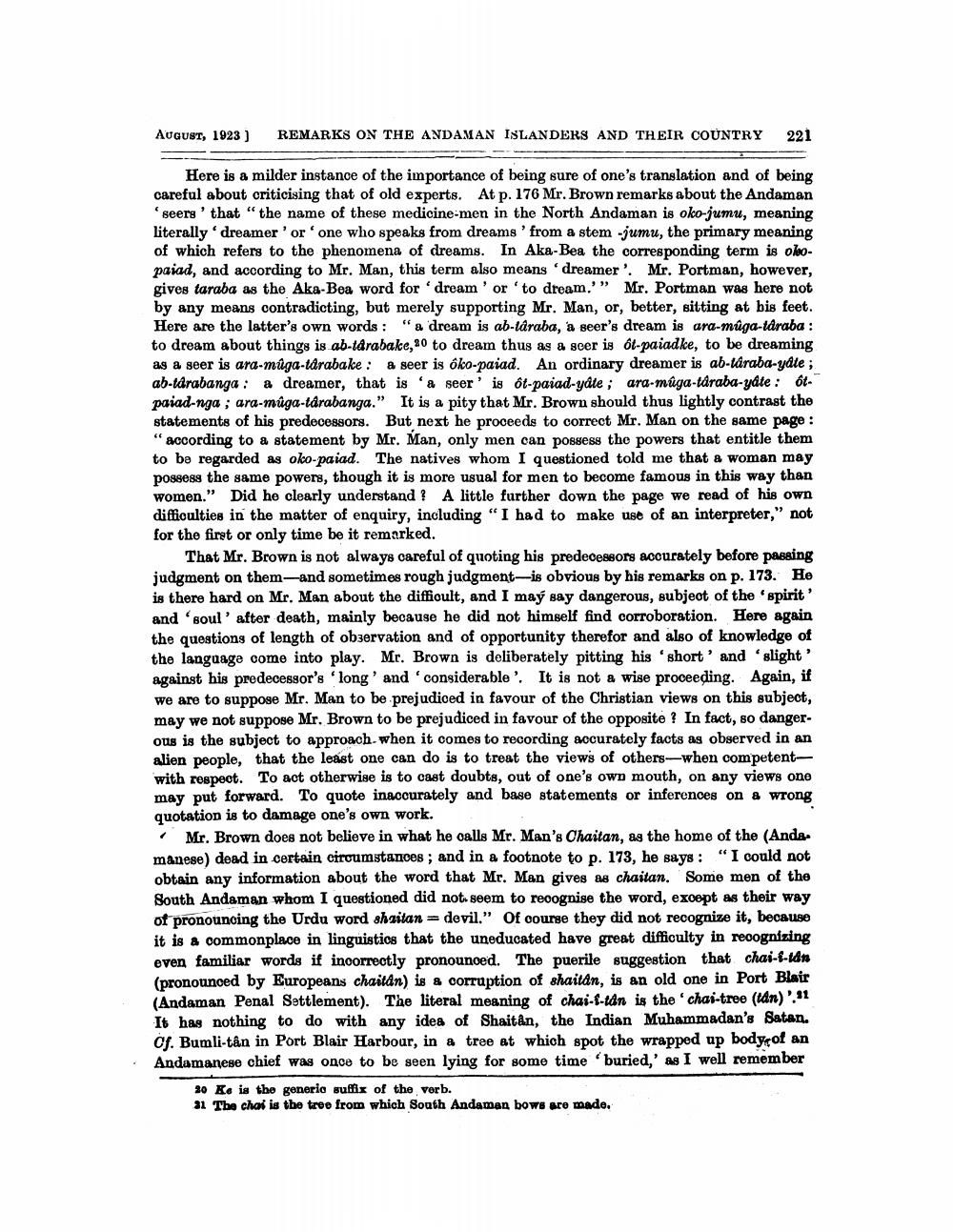________________
August, 1923)
REMARKS ON THE ANDAMAN ISLANDERS AND THEIR COUNTRY
221
Here is a milder instance of the importance of being sure of one's translation and of being careful about criticising that of old experts. At p. 176 Mr. Brown remarks about the Andaman
seers' that "the name of these medicine-men in the North Andaman is oko-jumu, meaning literally 'dreamer' or 'one who speaks from dreams from a stem jumu, the primary meaning of which refers to the phenomena of dreams. In Aka-Bea the corresponding term is olopaiad, and according to Mr. Man, this term also means 'dreamer'. Mr. Portman, however, gives taraba as the Aka-Bea word for 'dream' or 'to dream.'” Mr. Portman was here not by any means contradicting, but merely supporting Mr. Man, or, better, sitting at bis feet. Here are the latter's own words : "a dream is ab-làraba, a seer's dream is ara-mûga-tdraba : to dream about things is ab-tarabake, 20 to dream thus as a gcer is 6t-paiadke, to be dreaming as a seer is ara-muga-tdrabake: a seer is óko-paiad. An ordinary dreamer is ab-táraba-yáte; ab-tarabanga : a dreamer, that is 'a seer' is ôt-paiad-yáte ; ara-muga-táraba-yáte : Ôt. paiad-nga; ara-muga-tarabanga." It is a pity that Mr. Brown should thus lightly contrast the statements of his predecessors. But next he proceeds to correct Mr. Man on the same page : "according to a statement by Mr. Man, only men can possess the powers that entitle them to be regarded as oko-paiad. The natives whom I questioned told me that a woman may possess the same powers, though it is more usual for men to become famous in this way than women." Did he clearly understand! A little further down the page we read of his own difficulties in the matter of enquiry, including "I had to make use of an interpreter," not for the first or only time be it remarked.
That Mr. Brown is not always careful of quoting his predecessors accurately before passing judgment on them and sometimes rough judgment-is obvious by his remarks on p. 173. He is there hard on Mr. Man about the difficult, and I may gay dangerous, subject of the spirit' and 'soul' after death, mainly because he did not himself find corroboration. Here again the questions of length of observation and of opportunity therefor and also of knowledge of the language come into play. Mr. Brown is deliberately pitting his 'short' and 'slight' against his predecessor's 'long' and 'considerable'. It is not a wise proceeding. Again, if we are to suppose Mr. Man to be prejudiced in favour of the Christian views on this subject, may we not suppose Mr. Brown to be prejudiced in favour of the opposite ? In fact, so dangerous is the subject to approach when it comes to recording accurately facts as observed in an alien people, that the least one can do is to treat the views of others—when competent-- with respect. To act otherwise is to cast doubts, out of one's own mouth, on any views one may put forward. To quote inaccurately and base statements or inferences on a wrong quotation is to damage one's own work.
Mr. Brown does not believe in what he calls Mr. Man's Chaitan, as the home of the (Anda. manese) dead in certain circumstances; and in a footnote to p. 173, he says: “I could not obtain any information about the word that Mr. Man gives as chaitan. Some men of the South Andaman whom I questioned did not seem to reoognise the word, except as their way of pronouncing the Urdu word shaitan = devil.” Of course they did not recognize it, because it is a commonplace in linguistics that the uneducated have great difficulty in recognizing even familiar words if incorrectly pronounced. The puerile suggestion that chai-f-idin (pronounced by Europeans chaitan) is & corruption of shaitan, is an old one in Port Blair (Andaman Penal Settlement). The literal meaning of chai-f-tán is the chai-tree (tan)'. 11 It has nothing to do with any idea of Shaitan, the Indian Muhammadan's Satan.
Cf. Bumli-tân in Port Blair Harbour, in a tree at which spot the wrapped up body of an • Andamanese chief was once to be seen lying for some time 'buried,' as I well remember
20 Ke is the generis suffix of the verb. 31 The chan is the tree from which South Andaman bows are made.




